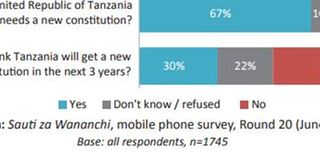Two in three Tanzanians want new constitution: Twaweza

What you need to know:
- The survey conducted shows that many Tanzanians are still eager to have new constitution
Dar es Salaam. Two out of three Tanzanians think that it is important for the country to get a new constitution, according to the views contained a new research brief by Twaweza issued October 19.
The brief, titled: Unfinished Business: Tanzanians’ views on the stalled constitutional review process, is based on data from Sauti za wananchi a nationally representative high-frequency mobile phone survey.
The findings are based on data collected from 1,745 respondents across Mainland Tanzania in June-July 2017.
Findings show that just over half of citizens (56 per cent) think that the final draft Constitution should be voted in a public referendum.
However, the survey further show that half of citizens (48 percent) believe that process to write a new major law will not happen within the next three years.
Yet, citizens also continue to be strongly supportive of a new constitution that emphasizes accountability.
Eight out of ten want ministerial appointments to be confirmed by Parliament (79 per cent), and six out of ten want to be able to remove MPs between elections (64 per cent).
The Executive Director of Twaweza, Mr Aidan Eyakuze, said citizens want a new constitution.
“Many want to start with a new Commission and a clean sheet of paper. But others are willing to go forward with the draft from the last commission,” he said adding:
“They also support the accountability orientation of the original draft constitution and they are clear that they want a new, more inclusive process to move forward with.”
“But,” he continued; “This survey also highlights the complex role of politics in questions around the legitimacy and inclusiveness of the constitutional process.”
“It is telling that direct mention of UKAWA causes citizens to judge the boycott more harshly than they do when asked about boycotts in general. When it comes to their politics, citizens' passion often overwhelms their objectivity,’’ he added.
According to the survey, citizens are more divided on some accountability measures including stopping foreign bank accounts for leaders and civil servants (54 per cent in support), term limits for MPs (52 per cent in support), and having transparency and accountability as part of the core set of national values (48 per cent support).
These are all aspects of the draft constitution that were dropped by the Constituent Assembly.
According to the survey, citizens support the removal of certain checks and balances around the office of the President (55 per cent) and the requirement for Ministers to come from outside Parliament (62 per cent).
Just under half of citizens on the Mainland (42%) support the current two-government structure and this is the most popular structure for Mainland citizens.
Less popular options include a single government (25 per cent), three governments as proposed by the Constitutional Review Commission (16 per cent), and something similar to the current structure but with more autonomy for Zanzibar (12 per cent).
Support for the current structure has grown from 25% in 2014 to 42% in 2017 and support for a three-government structure has declined slightly, from 22% to 16% during the same time.
Citizens on Zanzibar have very different views on this issue. When asked (in 2014), 46% supported a three-government structure and 45% supported the current two government structure with more autonomy for Zanzibar.
Alongside strong views on content, nine out of ten citizens (91%) agree that both the process of creating the constitution and the content itself are important. While 2 out of 10 citizens (18%) remember being part of the constitutional review process, 4 out of 10 (44%) feel that the process was about collecting views that were not necessarily then reflected in the constitution and 2 out of 10 (23%) feel that the process was just about sharing information not collecting citizens’ views.
This leaves 3 out of 10 (33%) who think the process was about actually listening to citizens’ opinions and reflecting these in the drafts.
In addition, although 9 out of 10 citizens have heard of the constitution, only 3 out of 10 can explain what it is. And close to half of citizens (49%) think that the President is the one who is supposed to drive the constitutional review process.
Overall women are less likely than men to know that a constitutional review process had been started (81% of men versus 61% of women) and to have given their inputs into the process (25% of men versus 10% of women).
One in four citizens (23%) were supportive of the boycott of the Constituent Assembly that was tied to the formation of the UKAWA (Umoja wa Katiba ya Wananchi – Union for the People’s Constitution).
A significant minority of citizens (41%) think that the boycott invalidated the rest of the process, but 56% disagree.
Interestingly when asked about this more generally (if a group decides not to participate, it makes the constitution less legitimate), the majority of citizens (56%) agree that this is the case.
Related stories


